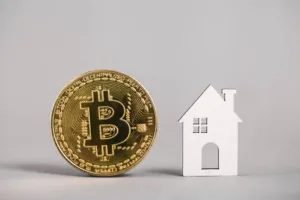Real estate industry:

The real estate market thrives on trust, security, and efficient transactions. However, traditional methods can be slow, paper-heavy, and prone to errors. This is where blockchain technology steps in, poised to revolutionise the way we buy, sell, and manage properties.
What is blockchain, and how does it work in the real estate industry?
Imagine a digital ledger that is constantly updated and accessible to everyone on a secure network. That’s the essence of blockchain. Transactions are recorded in chronological blocks, linked together in a chain that’s tamper-proof and transparent. This fosters trust and eliminates the need for intermediaries like banks or title companies.
Unlocking Blockchain’s Power in the Real Estate Industry

Let’s delve into the exciting ways blockchain is transforming the real estate landscape:
i. Streamlining Transactions: Forget mountains of paperwork! Blockchain automates tedious tasks, speeding up processes like title transfers and record-keeping. Imagine closing deals in a fraction of the time, with fewer errors and frustrations.
ii. Boosting Transparency: A blockchain creates an immutable record of ownership and property history. Every transaction is visible on the network, providing complete transparency for buyers, sellers, and investors. This fosters trust and reduces the risk of fraud.
iii. Fractional Ownership: Traditionally, real estate investment requires significant capital. Blockchain unlocks a new era of fractional ownership. A property can be “tokenized” into smaller digital units, allowing more people to invest in high-value assets. This opens doors for a wider range of investors and increases liquidity in the market.
iv. Smart Contracts: These self-executing agreements eliminate the need for third-party involvement. Imagine a scenario in which rental payments are automatically transferred from tenant to landlord upon lease completion, all coded and enforced by the smart contract. This reduces costs, eliminates human error, and streamlines rental management.
v. Global Reach: Blockchain transcends geographical boundaries. Imagine a global marketplace for real estate investments. International investors can easily access tokenized properties, boosting foreign investment and market accessibility.
Read More: IPOs vs. ICOs: How Blockchain is Changing Fundraising
Data and Statistics: Highlighting Blockchain’s Impact on Real Estate
A recent study by Worldmetrics revealed that 35% of surveyed real estate companies across the globe reported some level of blockchain adoption. Another report by Consensys suggests that blockchain-powered real estate transactions could save the industry a staggering $1.7 billion annually through reduced paperwork and streamlined processes.
The Benefits of Blockchain in Real Estate

So, how does this translate into the real estate world? Here are some of the game-changing benefits:
i. Enhanced Transparency: Blockchain ensures clear and verifiable ownership records. There is no more questioning a property’s history or dealing with fraudulent deeds. Every detail, from ownership changes to maintenance records, is securely stored for all authorised users to see.
ii. Streamlined Transactions: The traditional real estate process involves a lot of middlemen, paperwork, and delays. Blockchain cuts through the red tape. Smart contracts, self-executing agreements stored on the blockchain, automate specific actions upon meeting predetermined conditions. Imagine a scenario where a property transfer happens automatically once the buyer’s payment is verified on the blockchain. Faster, simpler, and more efficient.
iii. Fractional Ownership: Traditionally, investing in real estate often requires a significant upfront investment. Blockchain opens doors to fractional ownership. A property can be divided into digital tokens, allowing smaller investments from a wider pool of individuals. This democratises real estate investment, making it accessible to more people.
iv. Increased Liquidity: Selling a property can be a time-consuming process. Blockchain streamlines the process by creating a more liquid market. With fractional ownership and simpler transaction flows, buying and selling real estate becomes more efficient.
v. Reduced Costs: Eliminating intermediaries, such as title companies, and streamlining processes through smart contracts can significantly reduce transaction costs for both buyers and sellers.
vi. Improved Security: Fraudulent activity is a major concern in real estate. Blockchain’s secure and tamper-proof nature significantly reduces the risk of fraud by creating a verifiable and auditable trail of ownership and transactions.
Read More: How Blockchain is Making Shareholder Voting Obvious
Real-World Applications of Blockchain in the Real Estate Sector
These benefits aren’t just theoretical. Here’s how blockchain is already making waves in the real estate industry:
i. Tokenization of Properties: Real estate assets like buildings or apartments can be tokenized, creating digital representations on a blockchain. These tokens can then be bought and sold on dedicated platforms, facilitating fractional ownership and increased liquidity.
ii. Smart Contracts for Rentals: Smart contracts can automate rental agreements. Imagine a scenario in which rent is automatically deducted from the tenant’s account and transferred to the landlord upon occupancy. This eliminates late payments and simplifies the rental process for both parties.
iii. Streamlined Mortgages: Blockchain can revolutionise the mortgage process. Secure and transparent data storage on the blockchain can expedite loan approvals and improve efficiency for lenders and borrowers alike.
Challenges and Considerations

While blockchain holds immense promise, there are some challenges to consider:
i. Regulation: The legal framework surrounding blockchain technology in real estate is still evolving. Governments and regulatory bodies are working on establishing clear guidelines.
ii. Scalability: Current blockchain platforms might not be able to handle the high volume of transactions that the real estate industry demands. Scalability solutions are constantly being developed, but it’s an ongoing area of focus.
iii. Adoption: Widespread adoption of blockchain technology in real estate requires collaboration from various stakeholders, including government agencies, financial institutions, and real estate professionals.
The Future of Blockchain in Real Estate
Despite the challenges, the potential of blockchain in real estate is undeniable. As the technology matures, regulatory frameworks are established, and adoption increases, we can expect to see a significant transformation in the way we buy, sell, and manage real estate. This will benefit everyone involved, from individual investors to large corporations, creating a more transparent, secure, and efficient real estate market.
Read More: How Blockchain is Revolutionising Capital Markets
Conclusion
The real estate industry stands on the precipice of a transformative era. Blockchain technology presents a powerful toolkit to streamline processes, boost transparency, and unlock new avenues for investment. While challenges like regulation and scalability exist, they are not insurmountable. By embracing innovation and working collaboratively with regulators, the industry can pave the way for a future where real estate transactions are faster, more secure, and accessible to all.
Ready to join the revolution? Stay tuned for further exploration of how blockchain is impacting specific sectors within the real estate market. We’ll delve into how this technology is shaping property management, financing, and even crowdfunding opportunities. The future of real estate is bright, and blockchain is poised to be a game-changer.










